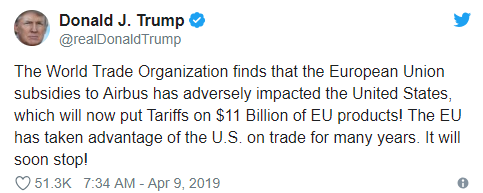Government/Policy

April 9, 2019
Tit-for-Tat Tariffs Over Aircraft Subsidies
Written by Sandy Williams
A long-term feud between Boeing in the U.S. and Airbus in Europe is coming to a head. Tuesday the U.S. threatened to impose $11.2 billion of retaliatory tariffs on European goods in response to the continued subsidization of the Airbus manufacturer.
“This case has been in litigation for 14 years, and the time has come for action,” U.S. Trade Representative Robert Lighthizer said in a statement. “The Administration is preparing to respond immediately when the WTO issues its finding on the value of U.S. countermeasures. Our ultimate goal is to reach an agreement with the EU to end all WTO-inconsistent subsidies to large civil aircraft. When the EU ends these harmful subsidies, the additional U.S. duties imposed in response can be lifted.”
A ruling by the Appellate Body of the World Trade Organization on March 28 set the retaliation in motion. As explained by Inside World Trade:
“Thursday’s Appellate Body decision said the U.S. was not yet in full compliance with a 2012 ruling that faulted subsidies provided to Boeing as counter to WTO rules. The EU called the ruling a victory because it knocked subsidy programs in the U.S., while the U.S. claimed a win because the decision showed that the EU’s subsidy programs to Airbus overshadowed the limited support Boeing has received from U.S. entities. A 2018 Appellate Body ruling also found EU subsidies to Airbus ran afoul of WTO rules.”
Both Boeing and Airbus issued statements urging the other to trade fairly and in compliance with WTO rules.
The size of the retaliatory duties is subject to arbitration by the WTO, but the EU Commission says the U.S. estimate is “greatly exaggerated.” The tariffs would be in addition to those imposed on steel and aluminum imports last year. President Donald Trump tweeted on Tuesday:
The full list of goods will be released this summer following the arbitration report form the WTO. Some of the items on the list so far include imports of fish, cheese, citrus fruit, olive oil, wines and liqueurs, textiles, ceramics, and motorcycles.
The European Commission said on Tuesday that the EU plans retaliation over the Boeing subsidies if an agreement cannot be reached with the United States.
“The Commission is starting preparations so that the EU can promptly take action based on the arbitrator’s decision on retaliation rights in this case,” a commission spokesman said. “The European Union remains open for discussions with the United States, provided these are without preconditions and aim at a fair outcome.”








